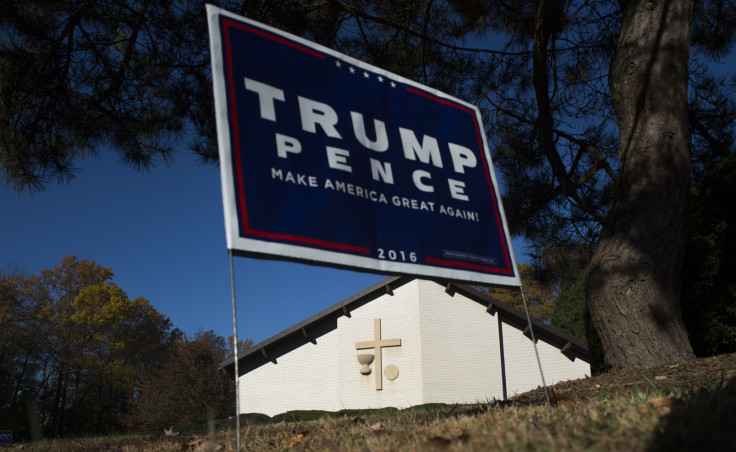Surprised American Evangelicals voted for Trump? They have a history of racism
President Trump means the end is nigh for Evangelicals — but it's a new dawn for white Protestants.

As a scholar of religion, one story that has intrigued me since the beginning of the 2016 presidential campaign is how Trump's candidacy—now his election—has engaged American evangelicals.
Since the late 1970s, evangelicals have been one of the most loyal supporters of the Republican Party. They have voted in overwhelming numbers for every Republican candidate since Ronald Reagan (and perhaps before). Yet in this election, a rift emerged between evangelical leaders. On one side, old-line evangelical culture warriors like James Dobson (now 80 years old), Pat Robertson, Ralph Reed, and the son of the Moral Majority founder, Jerry Falwell Jr. On the other were leaders who were adamantly opposed to Trump such as Albert Mohler and Russell Moore, who, although equally theologically conservative as Dobson and company, argued that a vote for Trump would be a capitulation of all that evangelicals have historically stood for.
Most observers thought that this division among leaders would trickle down to evangelicals-in-the-pews with most likely a split vote; some evangelicals voting for Trump, some for Clinton, and perhaps a majority voting for a third party candidate. What happened, was, to me, mind-blowing. Despite the fact that Donald Trump holds nothing in common with evangelicals—he has been married three times, has sought out extra-marital affairs, was heard bragging about his ability to grope and demean women however and whenever he wanted, and has at best, a tenuous grasp of Christianity – yet, more evangelicals voted for Trump than for either Mitt Romney, a committed Mormon, or George W Bush, a committed evangelical.
Although evangelicals wholeheartedly backed the winner in this election, Trump has unexpectedly exposed the dark side of evangelicalism that is rooted in racism, sexism, misogyny, and homophobia. It is no secret that evangelicalism has always been a patriarchal religious movement that claims that only marriage between a man and a woman and the modern nuclear family are ordained by God. Evangelical's conception of the family includes a perspective that sexuality and gender must be controlled, whether through roles available to men and women, the appropriately masculine and feminine presentation of self, or the act of sex itself – including who can have sex with whom.
What is less well-known is the history of racism within evangelicalism that has been a core part of its identity since its emergence in the early twentieth century, but that many had thought had become an historical artifact. As historian Randall Balmer has argued, the rise of the Moral Majority in the late 1970s was really about maintaining private white Christian schools, not about abortion or maintaining the nuclear family.
At Bob Jones University, rules that prohibited students, staff and faculty from dating or marrying someone of another race, were maintained until the early 2000s. And, while both the Moral Majority and Bob Jones University are in the South, other important evangelical institutions at least flirted with racist organizations such as the KKK. In the 1910s, Los Angeles pastor 'Fighting Bob' Shuler was on the Board of the Bible Institute of Los Angeles while he was organising Klan rallies at his church.
Evangelicals claim that their support for Trump was because of his stance on abortion and that they couldn't risk having Hillary Clinton appoint liberal justices to the Supreme Court. While these reasons may be true for many evangelicals, their support of Trump implicates them in his incendiary racist claims, and resurfaces the racist past of evangelicalism. Further, it suggests that they are fully in line with Trump's vision of a return to a 1950s version of America when racial minorities were no threat to white hegemony.
Now, evangelicalism can only be understood as a white, conservative Protestant political movement. Many evangelicals – both younger and older – have stopped identifying themselves as evangelicals. Others have left the Church altogether. And while this is not an immediate result of the election, the discomfort of many within evangelicalism with its overtly, and racial, political ideology elevated at its religious core, is certain to accelerate the exodus by those who neither support, nor are interested in being identified with a bigoted, ageing and backward looking religio-political movement. However, rather than giving up on Jesus, these former evangelicals are working to create innovative and distinctly Christian churches and ministries that take seriously both the gospel message, and the realities of a diverse world – as they seek to understand how they are called to act within it.
I grew up in the evangelical world. I went to evangelical schools, and even worked in an evangelical organisation for a while. While I am no longer a part of that world, I still have family and friends who are deeply embedded in the evangelical world who voted for Donald Trump. I did not, nor could I, vote for Trump or anyone remotely like him. Even though I have long since stopped being an evangelical, the moral core that I developed while growing up ensured that I could never consider voting for a person like Trump. I see that as a representation of the best of evangelicalism. Yet, because of the apparent ease with which most evangelical voters compromised their core values, I have lost any respect I may have had for what they say they believe. I suspect that most people outside of evangelicalism, and many within, would say the same thing.
Richard Flory is the Senior Director of Research and Evaluation at the Center for Religion and Civic Culture, University of Southern California
© Copyright IBTimes 2025. All rights reserved.






















